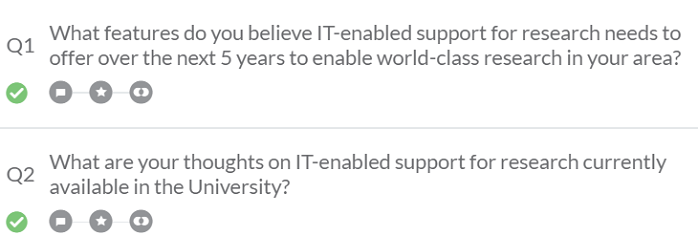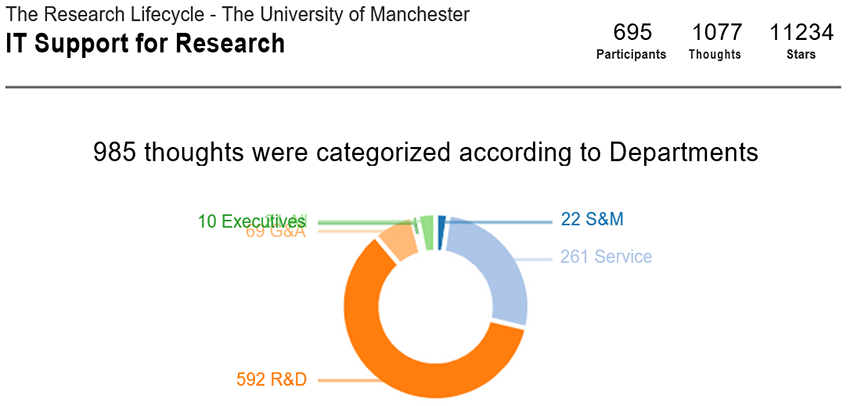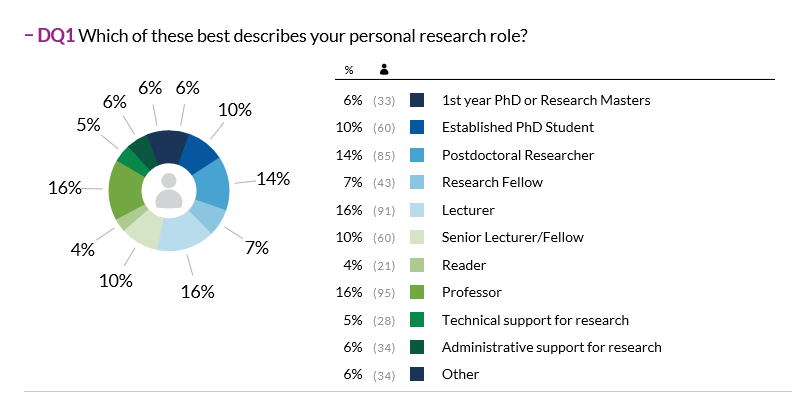
Newsletter: Outcomes of the survey
The outcomes of the Thought Exchange survey, and an invitation to our next Q&A session
This newsletter concentrates on the outcomes of the Thought Exchange survey we ran a few weeks ago, asking people for their opinions on Research IT.
We invite any University staff and students with an interest in research to attend our next event on Thursday 3 May to find out more information and have the opportunity to ask questions to the programme team.
The Thought Exchange
The inception of the Research Lifecycle Programme was a reaction to the needs and requirements of our research community. We have reported how we collected information from various stakeholders and researchers through one-to-one interviews and workshops.
Although we had a good sample of experienced and research-active cohort, it was important to us that every researcher had a chance to voice their needs. Therefore we encouraged school based self-run workshops and set up the Thought Exchange tool.
Why Thought Exchange?
For a broad topic like the Research Lifecycle, surveys often end up asking participants for a lot of information through a long list of questions, which take a lot of time to put together and a long time for respondents to answer. However, we wanted to hear your thoughts directly without influence or pre-empting.
Thought Exchange was a different tool for facilitating a University-wide conversation we wanted as part of this exercise. In selecting this tool, rigorous questions about the design and methodology of the platform were asked. The deciding factor that prompted the use of this platform was the capability of participants to articulate their own voice, and to see and rate other voices according to their interests.
As a novel tool Thought Exchange generated a number of questions from people; especially questions about how we would understand the output. In hindsight, we should have explained to participants that a feature of the platform is the provision of a powerful analytics engine in the background, allowing us to process the various thoughts to create insights. We should have made this explicit, asking participants to trust that we have the mechanisms to process the outputs.
The Questions
Usually when you are looking to solve a problem, you assess the current condition and then look at solutions. In framing the questions, we switched the order of the questioning deliberately as we are focused on change. This was borne in the results, as participation in the forward-looking question was higher.
The Results
Around 10% of our research community engaged with the Thought Exchange, giving a good sample across the various faculties and constituencies, with 695 participants.
There were 736 ‘5-year needs’ thoughts with 7649 Ratings, and 341 ‘current status’ thoughts with 3585 Ratings. These expressed thoughts both reinforced what we knew from the individual interviews/workshops and brought some new perspectives. This is a good result to re-assure the RLP team that we are on the right track.
The open nature of feedback meant that some of the top rated thoughts were not exactly answering the questions asked. These are in the realm of looking at the big picture of the subject matter. This is an important feature of this platform, providing clear respondents direction for the RLP and could not have been done in a traditional survey.
The chart below provides an analysis of the majority of thoughts:
Break down of thoughts by functional departments. (Please note that 92 thoughts were not categorised as they did not answer the questions)
- Executives – Strategic owners of RLP & ITS
- S&M (Sales and Marketing) – University communications issues
- Service – IT Services issues
- R&D (Research and Development) – e-Research Infrastructure (workstreams 1 and 2) issues
- G&A (General and Administrative) – Research Administration (workstream 3) issues, estates and teaching
- All – Multiple impact destinations
The participation in the Thought Exchange was nearly evenly split between faculties;
- 32% from the Faculty of Biology, Medicine and Health;
- 36% from the Faculty of Science and Engineering;
- 26% from The Faculty of Humanities;
- 6% from other areas (eg PSS).
The chart below shows that the thoughts were provided in nearly equal measures from all areas of the research community within the University:
The Analysis
The analysis of the various thoughts were carried and organised by the various roles, to understand the requirements of the various segments of the University research community organised by role and faculties.
The results were reflective of the nature of the role; Professorial staff were strategic in their requirements, while postdocs and lecturers were more practical and provided more thoughts about specific issues they face. First year PhD students’ thoughts were concentrated on requirements for training, collaborations and understanding availability of various resources to enable them to conduct research.
Common Themes
Research Data Management dominated the responses, and will be the subject of further analysis.
A requirement for improved IT procurement was a common theme across roles. IT Services have introduced a much more streamlined process. However, it seems that the impact of that changed process has not yet been felt, and some further potential improvements are being discussed.
Another common theme was the lack of knowledge of current capabilities and capacity of resources at the University. A good example of this is a highly rated thought which asked for the establishment of a University-wide research software engineering group like Sheffield. A pioneering group like this already exists at Manchester . This presents a definite requirement of improved communication and relationship management channels for the research support community.
Another area coming through strongly was collaboration and data sharing both within and outside the University.
Next Steps
We are using these inputs as part of the planning for the Research Lifecycle Programme. Where the points relate to areas outside the scope of the programme, we are ensuring that the needs of researchers are clearly articulated.
Our next newsletter on Wednesday 2 May will contain further detail, and there will be the chance to ask questions at our next open house event on Thursday 3 May.
Join us for May’s event, where we’ll present an update on the progress of the Research Lifecycle Programme, and give you the opportunity to ask questions.
- Thought Exchange survey
- PSS conference
- Q&A
Thursday 3 May, 12.30pm – 1.30pm in Room G209 of the Alan Turing Building.
If you’ve not already done so, we advise you to familiarise yourself with the programme by looking at the materials presented in our first open-house session on 28 February:














0 Comments